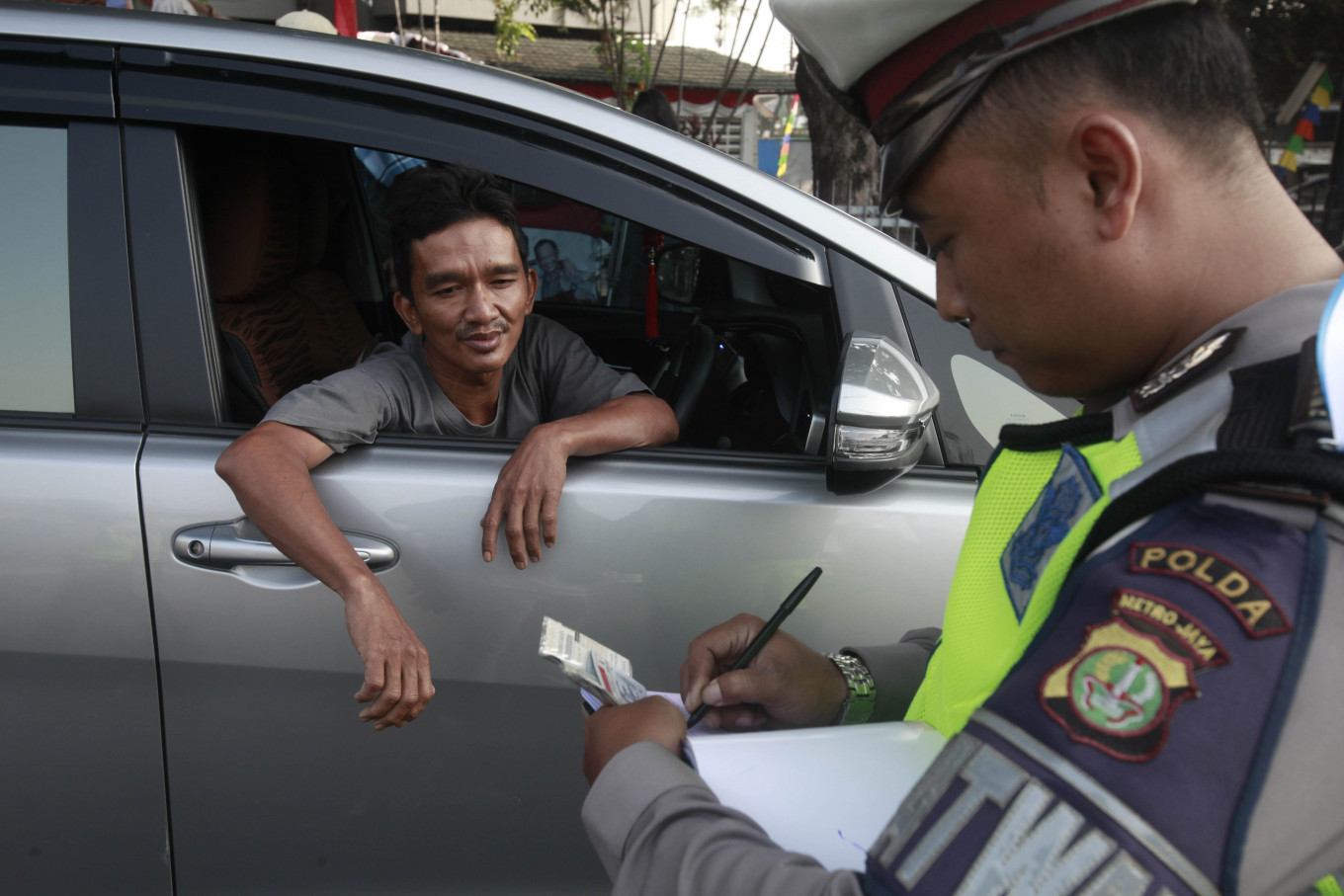Jakarta to reimpose odd-even plate policy as traffic returns
The Jakarta administration will reimpose the odd-even license plate policy on Monday in an effort to limit unnecessary car travel as the COVID-19 pandemic wears on.
Change Size

The Jakarta administration will reimpose the odd-even license plate policy on Monday in an effort to limit unnecessary car travel as the COVID-19 pandemic wears on.
Jakarta Transportation Agency head Syafrin Liputo said the odd-even traffic policy aimed to prevent the accumulation of travelers on the road.
“We hope the policy will deter people from making unnecessary trips. For example, [people with] cars with odd-numbered license plates would stay at home. The pattern [of restrictions] is expected to decrease traffic volume and, most importantly, ensure that there will not be an accumulation [of people] in public spaces,” he said on Friday, as reported by kompas.com.
The policy, which was lifted by the administration in the early days of the COVID-19 outbreak in March, will return to 25 thoroughfares on Monday and will be in place from then on from 6 a.m. to 10 a.m. and 4 p.m. to 9 p.m.
Syafrin explained that the administration had decided to reimpose the policy because traffic had increased as the city began its transition out of large-scale social restrictions (PSBB). “From our analysis, the traffic volume in some parts of the capital has increased beyond the normal condition before the pandemic,” he said.
The odd-even traffic policy was reimposed because the Jakarta administration had removed the requirement of obtaining an entry and exit permit (SIKM) to travel in or out the capital city during PSBB, Syafrin said.
As the SIKM requirement had been removed, the administration no longer had a means of limiting people’s mobility, so the license plate traffic policy had been reactivated, he explained.
Meanwhile, more than half of the people tested for COVID-19 at houses of worship were found to have the disease, health authorities have revealed.
According to epidemiologist Dewi Nur Aisyah of the national COVID-19 task force, the positivity rate in houses of worship has reached 74 percent, up from 51 percent, tempo.co reported. The positivity rate refers to the percentage of positive results of from all tests conducted in a cluster.
Jakarta Health Agency data from June 4 to July 28 shows there were 114 confirmed cases from nine houses of worship clusters across the capital. Most of them were located in churches and mosques, with three clusters each and a total of 40 cases.
Meanwhile, health authorities recorded one cluster in a clergy dormitory, pesantren [Islamic boarding school] and tahlil (Islamic prayers of the dead), with a total of 74 cases.
“The positivity rate likely [increased] because people kept gathering in one place, such as in a clergy dormitory,” Dewi said on Friday as quoted by tempo.co.
During its transition from PSBB, the capital determined five types of COVID-19 clusters, namely houses of worship, residential areas, markets, office and health facilities.
Jakarta Governor Anies Baswedan extended the transitional PSBB for another two weeks starting on Friday after Jakarta failed to slow down the daily increase in COVID-19 cases. The capital’s positivity rate hit 6.5 percent in the past week, above the figure recommended by the World Health Organization for relaxations, which is 5 percent or below.
The city’s latest COVID-19 daily reproduction number (Rt) also stood at 1. An outbreak is considered under control if the number is below 1.
“Considering the latest developments, we decided to extend the transitional PSBB until Aug. 13,” Anies said in a virtual press briefing on Thursday.
He further appealed to the public, especially businesses and workplaces, to comply with health protocols during the period, which is described as a "transitional" phase with the gradual reopening of several essential services.
Anies emphasized that office buildings — many of which had started allowing their employees to come to work — had recorded an alarming rate of new COVID-19 clusters over the past two weeks.
The city administration will impose progressive fines on businesses repeatedly caught violating PSBB regulations, Anies warned. (dpk/aly)









